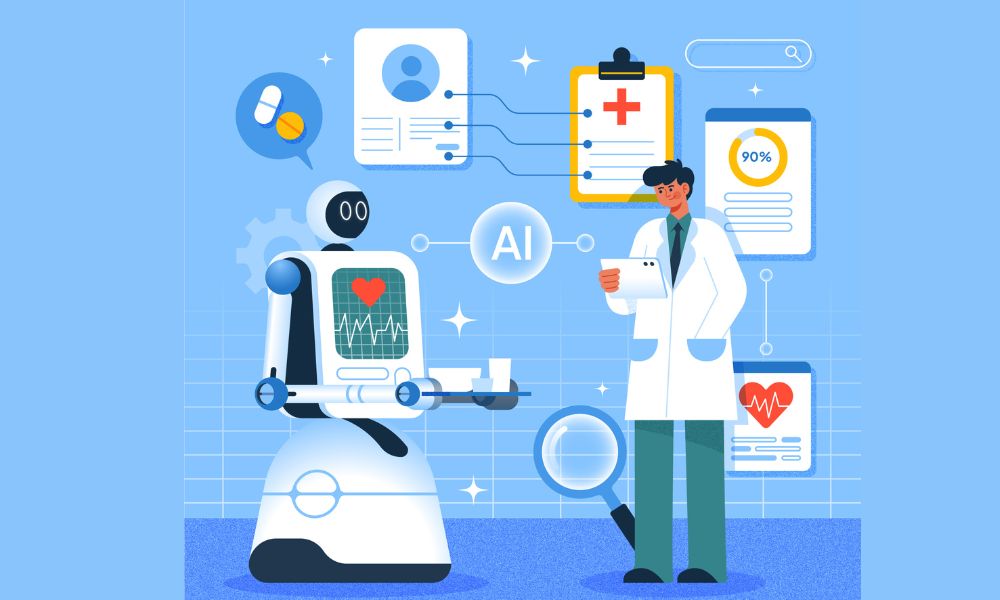 OVERVIEW
OVERVIEW
I want to share how conversational AI is helping patients and doctors right now. Conversational AI means chatbots or voice assistants that can talk with you like a person. You might know Siri or Alexa on your phone – healthcare uses similar programs to answer questions or give advice. For example, experts say conversational AI includes chatbots and voice helpers that make it easier to talk with patients. These smart helpers understand what you say and reply in plain language.
For example, you might picture a friendly robot like this one. In reality, conversational AI often means chatbots on your phone or computer. They can answer health questions and even book appointments.
So instead of just a cold website FAQ, you chat in plain words with the AI. It can talk about your symptoms and suggest when you should see a doctor. Chatbots can learn from each chat so they give better answers over time.
 Use Cases of Conversational AI in Healthcare
Use Cases of Conversational AI in Healthcare
Patients and clinics use these AI helpers for many everyday tasks. You probably can try some yourself. For example:
Appointment Scheduling and Reminders
Chatbots can help you book or change a doctor’s visit using just a few messages. They even send you reminders so you won’t forget. In fact, one study found about 67% of people would rather book an appointment through a chatbot than call on the phone. This means many of us like texting more than waiting on hold. AI handles checking the calendar and confirms the time for you.
Health Information and Symptom Checking
You can type your symptoms into a chatbot and it suggests what might be wrong or what to do next. For example, one popular app called Ada has done over 34 million symptom assessments already. That means many people have used it to figure out if they should see a doctor. These chatbots give quick tips like when to rest or see a doctor, based on your answers.
Medication Reminders
Conversational AI can remind you to take your medicines or refill a prescription on time. It helps you follow your care plan. A friendly chatbot might message you, “Don’t forget your medicine this evening!” which can keep you on track.
Mental Health Support
Some chatbots are like a friendly listener. You can talk about your feelings or stress in a private chat. Many users find this helpful – one survey showed 80% of people saw AI therapy as a good option, and some even preferred it to talking with a person. These chatbots give tips and coping tools if you feel anxious or sad.
Patient Feedback
Clinics want to know how to do better, and conversational AI can help. After a visit, a bot can send you a quick chat to ask how you’re feeling or to rate your care. Many people answer because chatting is easy. In fact, using a chatbot survey can get more replies than a long paper form. This helps doctors learn what patients like and don’t like in the clinic.
 Benefits of Conversational AI in Healthcare
Benefits of Conversational AI in Healthcare

Using conversational AI has big benefits for both you and doctors:
- Available 24/7: Chatbots never sleep. You can ask health questions any time – even late at night – and get an answer right away. It means you don’t have to wait until the clinic opens to get help or information.
- Saves Time: Routine tasks take time for doctors and nurses. When a chatbot handles simple questions or data entry, medical staff can focus on important work. For example, if a chatbot asks you about your symptoms before your visit, it sends the answers to the doctor. Then the doctor can spend more time examining you, instead of filling out forms.
- More Patients Helped: Because AI can book appointments fast and remind people, clinics see more patients. In one hospital system, a chatbot booked thousands of appointments and helped the clinic see about six times more patients than before. Chatbots reduce no-shows by reminding patients, so more people get treated on time.
- High Patient Satisfaction: Most people like using chatbots. Across many services, chatbot users report about 80–90% satisfaction. Patients often find these helpers prompt and easy. They get quick answers without waiting. That builds trust – if the bot gives accurate info, you feel more confident about your care.
- Better Health Outcomes: With reminders and easy info, you stay healthier. For example, a chatbot can remind you to take your medication on time or exercise if you need to. It can answer your follow-up questions about a condition in simple language. All these actions help you stick to your treatment and feel better faster.
 Real-World Examples of Healthcare Chatbots
Real-World Examples of Healthcare Chatbots
Let me share some real examples. Big organizations use conversational AI to help millions:
World Health Organization (WHO)
During COVID-19, WHO launched a chatbot on Facebook and WhatsApp. It answered common questions about symptoms and treatments in many languages. In 2022 alone, this WHO bot reached 13.5 million people worldwide. In places like Nigeria and Congo, it was the only reliable COVID info source in local languages.
Pfizer
The vaccine maker Pfizer deployed chatbots (like Medibot) to answer questions about their medicines. Trained on thousands of real questions from patients, these bots gave easy-to-understand answers and boosted patient satisfaction. People could ask about side effects or vaccine info and get quick help.
Ministry of Health in Oman
Oman created “Actionbot” during COVID. This bot answered virus-related questions and gave live stats on cases. In 2022, about 20,000 people per month used Actionbot for information. It helped many residents stay informed in English and Arabic.
Zydus Hospitals (India)
Zydus used a chatbot called ZyE. It talked to patients about symptoms and suggested a doctor to see. This chatbot handled over 640,000 conversations and booked 20,000 appointments. Over two years, their appointments jumped by six times thanks to ZyE. It even generated about $1 million in extra revenue by helping more patients get care.
 Conclusion
Conclusion
Conversational AI in healthcare is like having a smart helper available all the time. You, as a patient, can feel more in control. You get answers in your own words and at your own pace. Doctors and nurses can work smarter and treat more people. I think conversational AI is a big positive for healthcare today. It makes the system friendlier and more efficient. Hopefully this helps you see how AI chatbots are already helping patients and doctors right now!

